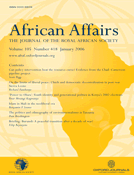-
Views
-
Cite
Cite
Dan Brockington, The politics and ethnography of environmentalisms in Tanzania, African Affairs, Volume 105, Issue 418, January 2006, Pages 97–116, https://doi.org/10.1093/afraf/adi071
Close - Share Icon Share
Abstract
This article explores the forms of environmentalism flourishing in Tanzanian villages and district and central government. It argues that their apparent unity should be explained by several factors. In central government, there is support for environmentalist policies because they generate revenue. In local government, environmentalism diverts attention away from bureaucratic failure, while simultaneously being the subject of intense politicking among the legislature. In villages, environmentalism reflects realities of environmental change, different ecologies of agricultural activity, competition and jealousy and the manipulation of official discourse. This article highlights the diversity of sources of environmentalist prominence in different sites of political activity.







Comments